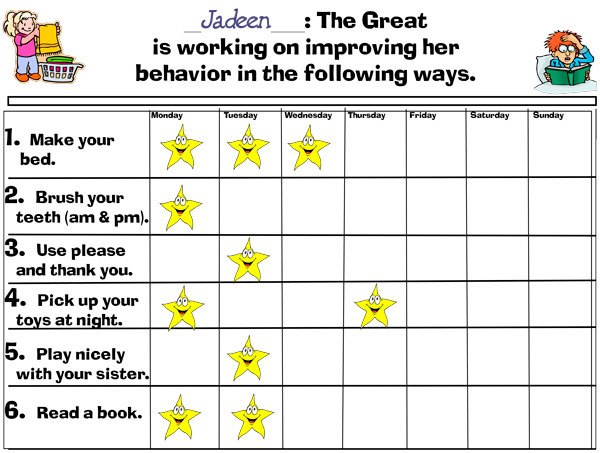Lists help Santa know what to deliver for Christmas but they also help children know exactly what is expected of them throughout the year. When your child sees exactly what you want her to do, she is more likely to do it. This is true in the early years and beyond.
Make a chart for the week or for several weeks. The chart doesn’t have to be fancy. Have fun making it and then just change what you list from time to time. See the chart we have included to get some ideas. Remember it isn’t how the chart looks, it is how you use it.
List the things you expect of your 5-year-old such as 1) Brush your teeth in the morning, 2) Make your bed, 3) Say please and thank you during the day when people help you, 4) Pick up your toys at night, 5) Play nicely with your sister, 6) Read until time to turn out lights.
If she is older, make sure her tasks reflect her age. They might include 1) Coming in before her deadline, 2) Not missing one assignment, 3) Getting along with her sister, 4) Completing her weekend chores, 5) Setting the table or washing dishes at night, 6) Being polite with everyone.
It helps to have one tough thing in each group. In the group shown, playing with your younger sister and then as she gets older getting along well with her might be a challenge. You can change them as frequently as you need to. You obviously need to check them each day.
Talk about the list and make a big deal about it. Make sure you have some stars or at least learn how to draw pictures each time she does what she is supposed to do on her list. Talk about the list at dinner so everyone knows what she is doing. In that way you can reward her when she gets so many stars in a row or when she does everything she is working on without you reminding her.
Set goals of a certain number of stars might earn her another reward. Five-year-olds might be happy with an ice cream cone. Older children are likely to expect a little more.
Talk with her about how responsible she is becoming as you see the chart fill up.
Save her charts so you can go back over them and talk about how many things she has learned and how much her behavior has improved. Put your emphasis on the improvements — not on the empty squares.
Cynthia Martin is the founder of the First Teacher program and director of Parenting Matters Foundation, which publishes newsletters for parents, caregivers and grandparents. Reach Martin at pmf@olypen.com or at 681-2250.


